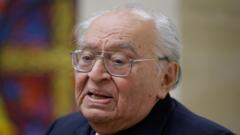Father Gustavo Gutiérrez, a pioneering figure in liberation theology, has died at the age of 96 in Lima, Peru. A Dominican friar and esteemed theologian, Gutiérrez's influential 1971 work, "Theology of Liberation," propelled the Catholic Church into an active role against poverty and social injustice, despite criticisms from conservative factions within the Church.
Described by some as a Marxist, his approach emphasized empathy for the poor and called for the Church to engage with the societal issues plaguing its least fortunate congregants. His ideas faced significant backlash, particularly from Cardinal Joseph Ratzinger, who later became Pope Benedict XVI. Ratzinger characterized liberation theology as a potential catalyst for rebellion, viewing its Marxist undertones as a substantial threat.
Yet, under the papacy of Jorge Mario Bergoglio, known as Pope Francis, relations between Gutiérrez and the Vatican improved. Pope Francis lauded Gutiérrez’s contributions to the Church in a personal letter for his 90th birthday, endorsing the concept of "a poor Church for the poor."
Gutiérrez's rich academic background included studies in medicine, literature, philosophy, psychology, and theology, fostering a comprehensive view of societal issues. He frequently refuted claims that his teachings encouraged revolutionary impetus, insisting that his work stemmed from biblical roots. Upon returning to Peru from Europe, he observed that the Church was often disengaged from the questions and struggles faced by impoverished communities.
In his writing, Gutiérrez boldly proclaimed that poverty is a man-made condition, asserting that "No one is born to suffer, but to be happy." His approachable demeanor and genuine connection with his parishioners distinguished him, engaging them on diverse topics beyond theology, such as traditional music and cinema, making him a beloved figure within the community.
Colleagues and parishioners remember him for his warmth, ability to translate complex theological ideals to simplistic terms, and his unwavering commitment to promoting hope amid adversity. As Peru and the wider world mourn the loss of Gutiérrez, his legacy as a champion for the marginalized and a transformative voice within the Roman Catholic Church endures.


















